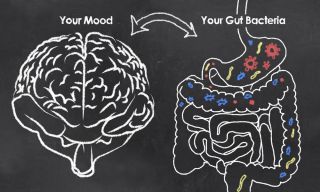Microbiome
Gut Microbiota Play a Critical Role in the Brain
The effect of microbiomes on personality and identity.
Updated June 29, 2023 Reviewed by Ray Parker
Key points
- The modification of the gut microbiome could be a novel approach to enhancing mental health.
- Serotonin and other chemical compounds in the brain play a role in shaping our identity and personality.
- The gut microbiota influences chemical compounds and, consequently, our personality.

In his book Listening to Prozac, Peter Kramer states that patients who use Prozac or Fluoxetine report experiencing unusual changes in their personalities, characteristics, beliefs, judgments, and decisions. Fluoxetine is a type of antidepressant medication known as a selective serotonin reuptake inhibitor (SSRI). It works by increasing the levels of serotonin in the brain.
Serotonin, a neurotransmitter, plays a crucial role in regulating mood, sleep, appetite, and other cognitive processes in the central nervous system. The drug was introduced in the United States in 1988 and quickly gained popularity.
However, after a couple of years, psychiatrists began to suspect the potential side effects of Fluoxetine. Kramer explains a situation in which a woman faced numerous problems with her husband at home and her boss at work. She had low self-esteem and was afraid of making new decisions in her life.
After using fluoxetine for a while, she underwent a complete transformation. She left her husband and enthusiastically sought new partners, going on several dates per week. Some Prozac users, including her, have claimed that they no longer recognized themselves after taking the medication.
Serotonin, known as the "happy hormone," is a mood enhancer. Low levels of serotonin have been associated with negative self-perception, including low self-esteem, negative self-image, social isolation, and negative thoughts. On the other hand, high levels of serotonin have been linked to positive self-perception, such as high self-esteem and a positive self-image.
Furthermore, studies have revealed that serotonin also plays a role in social behavior and decision-making, which can have an impact on an individual's personality traits. For example, low levels of serotonin have been associated with impulsivity and aggression, whereas high levels of serotonin have been linked to positive social behavior and self-control.
A decline in serotonin levels is observed in aged individuals and may contribute to depression and a reduced stress response in the elderly. However, other neurotransmitters and neuropeptides are involved in shaping mood, personality, and identity, such as dopamine and oxytocin. Overall, the relationship between serotonin, self-perception, and personality is complex and multifaceted. However, research suggests that serotonin plays a crucial role in shaping these aspects of human experience.
The microbiome affects serotonin levels in the brain
The microbiome has been found to influence various aspects of brain function and behavior, including mood, anxiety, and cognition. Several mechanisms have been proposed to explain how the microbiome affects cognition, including the production of brain-affecting chemical compounds through fermentation, such as butyrate, the metabolism of amino acids that serve as precursors to brain neurotransmitters, and the direct production of neurotransmitters.
The gut microbiota plays a critical role in regulating serotonin levels in the brain, which can subsequently impact cognitive function. Studies have shown that gut microbiota can influence serotonin levels in the brain through the gut-brain axis. Approximately 90 percent of the body's serotonin is produced in the intestines by specialized cells known as enterochromaffin cells. These cells are located in proximity to the microbiota and are influenced by the microorganisms that reside in the gut.
The gut microbiota can produce neurotransmitters, including serotonin, dopamine, and gamma-aminobutyric acid (GABA), which can impact the central nervous system. Certain strains of bacteria can consume tryptophan, an essential amino acid that serves as a precursor to serotonin production in the host's body.
These types of microbes reduce the precursor of serotonin in the brain. Studies have shown that alterations in the gut microbiota can cause fluctuations in serotonin levels in the brain, leading to mood disorders like depression and anxiety. Conversely, studies have shown that probiotics and prebiotics can enhance mood and alleviate symptoms of depression and anxiety by regulating the gut microbiota and boosting serotonin production.
SSRIs teach us that the microbiome may also play an essential role in determining our personality and identity.
Philosophers have long debated the relationship between the brain and the self. In the modern age, neuroscientists have suggested that the brain is the main organ responsible for shaping one's self and personality. The vast number of neuronal connections formed by perceptions and sensory signals contribute to the formation of our identity and sense of self.
Some researchers have proposed that uploading the brain's connection blueprint into a supercomputer could recreate the self in a virtual world indefinitely. However, some scientists argue that the self is not a stable entity that remains constant over time, but rather a continuously evolving phenomenon influenced by environmental factors, personal experiences, and culture.
There is limited research on the direct influence of the gut-brain axis on personality traits. However, studies have shown that gut microbiota can affect mood and behavior, which can indirectly influence an individual's personality traits. For example, individuals with an imbalanced gut microbiota may experience symptoms of anxiety and depression, which can affect their overall well-being and behavior. A healthy gut microbiota, on the other hand, may promote positive emotions and cognitive function, which can lead to a more positive personality.
A new approach for treating mental disorders
Prebiotics are dietary compounds that are utilized by the gut microflora and have an impact on the diversity of the microbiome. Probiotics are living microorganisms that can directly modify the composition of the microbiome. By improving gut microbiota diversity, prebiotic, and probiotic approaches can be used to enhance mental and cognitive health.
Psychobiotics are a novel class of medication used to treat mental disorders, which act on the gut-brain axis to improve mental health. On the other hand, the microbiota signature may be considered a factor that influences not only our physical health but also our decisions and behavior. This is in addition to other factors that shape our personality. Further research is necessary to comprehensively comprehend the intricate correlation between the gut-brain axis and personality.
References
Kramer, P. D. (1994). Listening to Prozac: Fourth Estate.
Sjöstedt, P., Enander, J., & Isung, J. (2021). Serotonin Reuptake Inhibitors and the Gut Microbiome: Significance of the Gut Microbiome in Relation to Mechanism of Action, Treatment Response, Side Effects, and Tachyphylaxis. Frontiers in Psychiatry, 12.
Appleton, J. (2018). The Gut-Brain Axis: Influence of Microbiota on Mood and Mental Health. Integr Med (Encinitas), 17(4), 28-32.
Del Toro-Barbosa, M., Hurtado-Romero, A., Garcia-Amezquita, L. E., & García-Cayuela, T. (2020). Psychobiotics: Mechanisms of Action, Evaluation Methods and Effectiveness in Applications with Food Products. Nutrients, 12(12).




